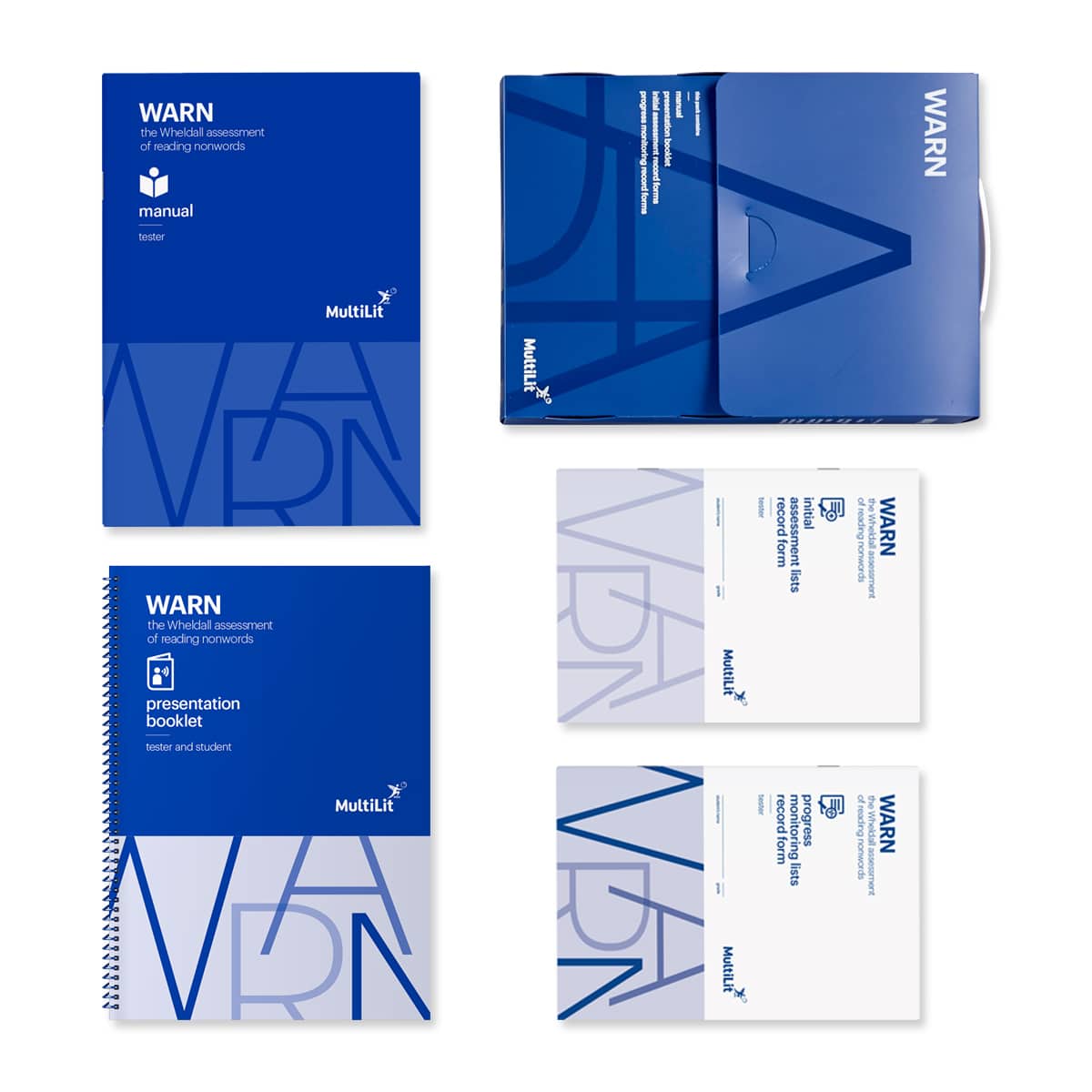WARN
Wheldall Assessment of Reading Nonwords
For beginning readers, reading depends largely on how well they can decode unfamiliar words. However, there are few tests that measure phonological recording (or nonword reading) satisfactorily in the early years, and far fewer that measure fluency and allow for regular monitoring.
The WARN (Wheldall Assessment of Reading Nonwords) is a simple measure of reading performance for younger readers (Foundation and Year 1). Using the 50-word lists provided, teachers can assess a student’s level of oral reading fluency and compare this to benchmarks in just one minute. It may also be used to predict likely performance on the Phonics Screening Check so that any necessary intervention may be commenced in good time.
Who is it for?
- Designed to assess the reading of students in Foundation and Year 1
- Suitable for use by classroom teachers, learning support teachers and other school personnel involved in literacy instruction
The WARN is a companion tool to the WARL (the Wheldall Assessment of Reading Lists) and the WARP (the Wheldall Assessment of Reading Passages).
Key benefits
- Brief and straightforward to administer and score
- Timed, so that it measures reading fluency and not just accuracy
- Associated with valid and reliable Australian performance benchmarks, to allow for easy identification of struggling decoders
- Ideal for progress monitoring
- Aligned with the content and sequence of initial literacy instruction.
How is it administered?
The WARN comprises three Initial Assessment Lists and 10 Progress Monitoring Lists. provides a set of 50-word lists, which students read for just 30 seconds. The number of words read correctly provides a measure of the student’s level of oral reading fluency, and the benchmarks provided allow for the easy identification of the bottom 25% of students. As a fast and simple measure to administer, the lists can then be utilised on a fortnightly basis to monitor the performance of individual readers.
How does the WARN relate to Response to Intervention?
Assessment is an important part of a Response to Intervention (RtI) model, as educators need to determine when students need more intensive instruction (and also, when they no longer require intensive instruction).
This assessment must be conducted frequently (and therefore quickly), and must be a valid measure of an entire academic area (in this case, reading). Curriculum-based measurement satisfies these criteria, and as the WARN is a curriculum-based measure of reading, it can be used for this purpose.
Within an RtI model, the WARN can be used for screening, progress monitoring, and instructional decision-making.
Kit components
The WARN Kit consists of the following components:
- Manual
- Presentation Booklet, containing three Initial Assessment Lists and 10 Progress Monitoring Lists from which students read during the test
- 30 Initial Assessment Lists Record Forms (sufficient for 30 students)
- 15 Progress Monitoring Lists Record Forms (sufficient for 15 students). The form includes an area to manually chart a student’s progress.
- Access to a tool for the management and charting of students test scores (downloadable from the MultiLit Members’ Area).
Please note: Both the Initial Assessment Lists Record Forms and the Progress Monitoring Lists Record Forms can only be used once. Replacements will need to be purchased from MultiLit once the forms provided in the Kit have been used.
Measuring Reading Progress Professional Development Workshop
It is not enough to simply assess the reading of students – it is important that teachers know what to do with the information.
This Professional Development Workshop will provide teachers with a solid understanding of the importance of using data to monitor students’ reading progress on a very regular basis so that no student gets left behind.
It will also emphasise the need for a consistent school-wide approach to reading assessment, linking the measurement of reading progress to the three tiers of intervention within the Response to Intervention framework.
What the workshop covers
- How to identify a good test
- Types of reading assesments
- What do we need to assess?
- Problems with Running Records/benchmarking
- How to create a coherent school-wide reading assessment process
- Training in the WARP (Wheldall Assessment of Reading Passages), WARL (Wheldall Assessment of Reading Lists), WARN (Wheldall Assessment of Reading Nonwords) and the WSCS (Wheldall Sentence Comprehension Screener). The WARN can be used to predict which students are at risk of not meeting the Year 1 Phonic Screening Check threshold, while WARL and WARP can be used to screen students at risk of reading difficulties and to track their ongoing progress. The WSCS is a screening measure to identify receptive language difficulties in children entering their first year of school.
Who should attend
- School leaders
- Classroom and learning support teachers
- School counsellors
- Specialist reading teachers/tutors
- Literacy coaches who are working with students from Foundation to Year 8/9.
Please note: The use of MultiLit publications and attendance at professional development workshops is for personal education use in schools with State/Territory accreditation (‘Accredited Schools’). Other commercial use, hiring or lending, or other use as part of any commercial, not-for-profit, or fee-paying program of instruction or tuition not carried out within an Accredited School is strictly prohibited.
